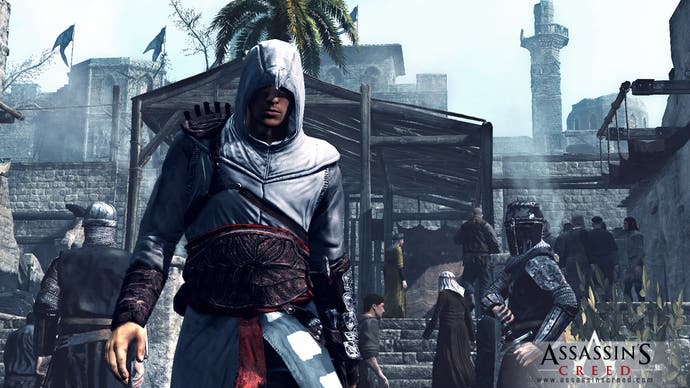Assassin's Creed
Jade Raymond spreads the good word.
One of the 2007's most anticipated games, Assassin's Creed thrusts you into the boots and four-fingered glove of a killer during the Third Crusade. Or is it? Ubisoft Montreal's figurehead for all things Assassin's is Jade Raymond, and she's not yet shedding firm light on the game's setting. Mysterious death screens and other details about main character Altair have led to all sorts of guessing. Comments about "genetic memory" upon player-death perhaps point to some sort of futuristic gene-reading technology, that absorbs recollections from captured genes, and Raymond's confirmed that Altair's no time-traveller. Still, the speculation pales next to the potential fun of hopping across rooftops in parkour-inspired free runs, evading pursuers and taking out your marks with a dagger poking out of your third knuckle. We sat down with Raymond at UbiDays in Paris recently, as you'll no doubt have seen on Eurogamer TV. What follows is the full interview transcript.
First, [the new trailer] did show off some of the other cities that you haven't seen before. So if you pay attention to the trailer you'll see we showed some shots in Damascus, which hasn't been shown before, and we showed Jerusalem, and we showed Acre. But we're really saving the next big hands-on and demo and live playing and everything else for mid-July, so in the US we're going to have a big event that's assassins-only at E3, and then we're organising a thing also for Europe.
I can't comment on that [laughs] unfortunately. We will be able to tell you... there is something else there. I think we have been dropping some pretty obvious hints. There's been some people talking about it. I think if you really do your research, if you pay attention to the stuff we've shown and some of the more in-depth articles you can probably piece it together, but we'll be giving away some of the stuff we haven't been telling in a few months.

No, there isn't. The thing we're doing with Assassin's Creed is we created a brand new franchise and that means that we wanted to for a change not go, 'oh, the first game was a success - what do you do with the second game?' if you're so lucky, right? We want to make a real plan where you can make a game, you make a book, you know, maybe other types of portable games that have complementary experiences, you can make a movie, if the game does well you can make a sequel - and not have it be we have to scratch our heads about a framework that it has to fit into from the start. So it's not any other Ubisoft games; it's really like stuff that I can't talk about [laughs]. The conspiracy is linked to the stuff I can't talk about.
One would think, but actually we created a brand new engine from scratch, which is going to be used by some other projects at Ubisoft, but Splinter Cell is based on the Splinter Cell engine so it's not at all the same technology. You know, crowd gameplay was one of the big promises of the next-gen. We all thought, 'ok, what can we do?' So, actually, surprisingly, we came up with some of the same ideas in terms of what crowd gameplay is, but in terms of the experience and the scope and being an assassin in the Third Crusade, and having loads people on screen is very different to what you're going to experience being a fugitive in the small areas that's really based on physics and interaction and those kinds of things [that Splinter Cell offers].

